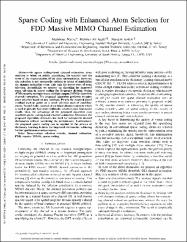Sparse coding with enhanced atom selection for FDD massive MIMO channel estimation
Künye
Nazzal, M., Aygül, M. A. ve Arslan, H. (2021). Sparse coding with enhanced atom selection for FDD massive MIMO channel estimation. 94th IEEE Vehicular Technology Conference (VTC-Fall). Virtual, 27-30 September 2021. https://dx.doi.org/10.1109/VTC2021-Fall52928.2021.9625408Özet
In sparse coding-based channel estimation, atom selection is based on jointly minimizing the sparsity and the error of the representation of the noisy measurement. However, this selection is not necessarily optimal in terms of minimizing the channel estimation error. This calls for better ways of atom selection. Accordingly, we propose an algorithm for improved atom selection in sparse coding for frequency division duplex (FDD) massive multiple-input-multiple-output (MIMO) downlink channel estimation. The proposed algorithm performs iterative atom selection based on two residuals. First is the received signal residual used to guide on a small selection pool of candidate atoms. Second is the residual of an initial channel estimate which is used to pick the best atom within the selection pool. Simulation results show the advantage of the proposed algorithm over standard sparse coding-based channel estimation. Moreover, the proposed algorithm eliminates the need for cell-specific trained dictionaries without sacrificing the performance. Furthermore, the proposed sparse coding can be applied in the process of dictionary learning to train for improved dictionaries achieving further performance enhancement.
Kaynak
94th IEEE Vehicular Technology Conference (VTC-Fall)Cilt
2021Bağlantı
https://dx.doi.org/10.1109/VTC2021-Fall52928.2021.9625408https://hdl.handle.net/20.500.12511/8945
Koleksiyonlar
- Bildiri Koleksiyonu [206]
- Scopus İndeksli Yayınlar Koleksiyonu [6561]
- WoS İndeksli Yayınlar Koleksiyonu [6621]


















